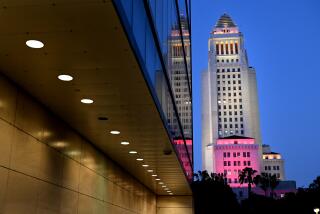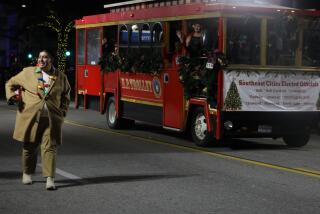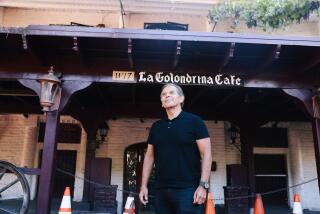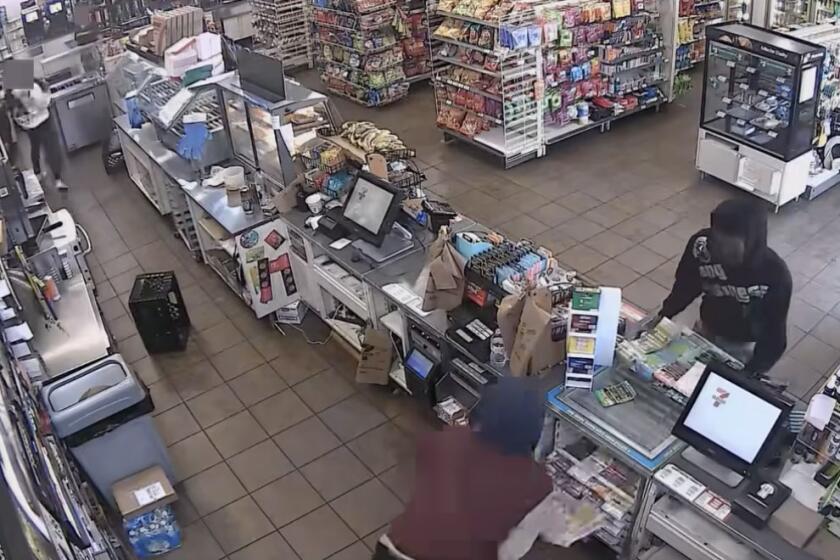Devil of a time with City of Angels’ name
Texas Gov. Rick Perry, President Theodore Roosevelt and Bugs Bunny might appear to have little in common, but they do share one distinction:
They’ve all mispronounced Los Angeles.
Perry committed his gaffe the other day at the Los Angeles Memorial Sports Arena when he greeted a Latino group with the words, “Buenos dias, Los Angeles!” He rendered the city’s name as Loce AN-guh-leeze, as though it contained a hard G and rhymed with “fleas.”
It was somewhat reminiscent of the time President Roosevelt referred to the City of Angels as Loss AN-jee-leeze during a 1903 visit, according to historian John Weaver.
Bugs Bunny would later use the hard-G pronunciation as well, though it is probable that the rabbit was just being mischievous.
Mispronouncing L.A. is an old tradition.
“There is no other city in the world whose inhabitants so miserably and shamelessly, and with so many varieties of foolishness, miscall the name of the town they live in,” author Charles Lummis wrote in 1914.
As early as 1880 the Chamber of Commerce issued this reminder to visitors (and residents):
The Lady would remind you, please
Her name is not Lost AN-jie-lees.”
But what is the lady’s name? It depends, of course, on whether one is talking about a Spanish or Anglicized pronunciation.
In the early 1900s, The Times advocated the Spanish version, carrying a box by its editorial page masthead that proclaimed the way to say Los Angeles was Loce AHNG-hayl-ais.
English speakers who found that difficult could only be thankful that the city had shortened its original name, which some scholars believe was El Pueblo de Nuestra Senora la Reina de los Angeles de Porciuncula.
The Times’ campaign aside, the United States Board on Geographic Names decreed in 1934 that the name should be Anglicized to Loss AN-ju-less.
The Times said the federal agency’s decree made the city “sound like some brand of fruit preserve.” It detected a conspiracy to rob California cities of their “soft, sibilant Spanish syllables” and asked whether San Jose would next be pronounced San JOCE and San Joaquin would become San JOK-kin.
The newspaper predicted that the change to Loss AN-ju-less would “find no favor with the people of Southern California.” The Times was correct, to a point, but not in the way it meant.
While the Spanish version lapsed into disuse, a debate arose over newcomers using an alternative Anglicized version with a hard G — something along the lines of Loss AN-guh-less.
So, in 1952, Mayor Fletcher Bowron impaneled a jury of experts to determine an official pronunciation, once and for all, for the city. After all, Los Angeles was approaching its 171st birthday. It was time to figure out what to call it.
A Times reporter noted, incidentally, that in Bowron’s remarks, “the mayor carefully steered clear” of trying to say Los Angeles, “referring to it as ‘our city.’ ”
The jury, composed of pioneers, language professors, radio announcers and, for some reason, newspapermen, voted for Loss AN-ju-less.
USC professor Dwight Bolinger told The Times that “from a Spanish language standpoint, the pronunciation is not as much at variance with the true Spanish as that employing the hard ‘g.’ ”
Mayor Bowron gamely confessed what many had believed — that he was a hard-G man. “This means breaking a habit of most of my lifetime but I’ll go along,” he vowed.
A senior city librarian was appointed to head a committee to notify “all publishers of dictionaries” as well as “all radio and television stations and boards of education and libraries.”
Perhaps someone forgot to remind City Hall. A few years later, Times columnist Jack Smith detected another mayor, Sam Yorty, using “a sort of nasalized Law SANG-lus” version, which he “brought with him from Nebraska.”
The eeze-ending wasn’t dead, either. Besides Bugs Bunny cartoons, it popped up in an Arlo Guthrie counterculture hit that went like this:
Coming into Los AN-ju-leez
Bringing in a couple of keys
Don’t touch my bags if you please
Mr. Customs Man.
During the 1995 O.J. Simpson trial, historian Bruce Henstell complained that defense attorney F. Lee Bailey was “making the name of our fair city rhyme with bees.”
And, now, the Texas governor’s assault on Angeleno ears. Perry was apparently trying to use the Spanish pronunciation in his opening. He wisely used a translator for the rest of his speech. (Perry can be heard on this link to a National Public Radio piece.)
Of course, when it comes to Los Angeles’ name, there is another option, one that Mayor Bowron feared was taking over in 1952.
As The Times reported back then, “the mayor prayed that civic pride would prevent its citizens from ever, ever referring to it as ‘L.A.’ ”
More to Read
Start your day right
Sign up for Essential California for news, features and recommendations from the L.A. Times and beyond in your inbox six days a week.
You may occasionally receive promotional content from the Los Angeles Times.






